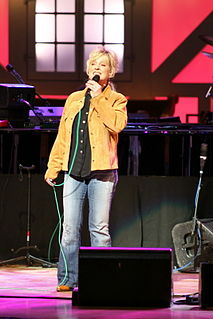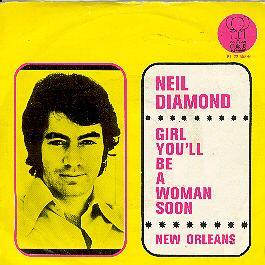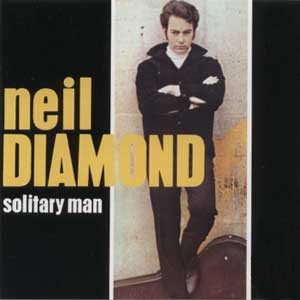See also
- "I'll Come Running Back to You", a 1957 song by Sam Cooke
I'll Come Running may refer to:

Neil Leslie Diamond is an American singer-songwriter, musician and occasional actor. He has sold more than 100 million records worldwide, making him one of the best-selling musicians of all time. He has had ten No. 1 singles on the Hot 100 and Adult Contemporary charts: "Cracklin' Rosie", "Song Sung Blue", "Longfellow Serenade", "I've Been This Way Before", "If You Know What I Mean", "Desirée", "You Don't Bring Me Flowers", "America", "Yesterday's Songs", and "Heartlight". Thirty-eight songs by Diamond have featured in the Top 10 on the Billboard Adult Contemporary charts. He also played in movies such as The Jazz Singer, a musical drama film.
An answer song, response song or answer record, is a song made in answer to a previous song, normally by another artist. The concept became widespread in blues and R&B recorded music in the 1930s to the 1950s. Answer songs were also extremely popular in country music in the 1950s and 1960s, most often as female responses to an original hit by a male artist.

Connie Smith is an American country music singer and songwriter. Her contralto vocals have been described by music writers as significant and influential to the women of country music. A similarity has been noted between her vocal style and the stylings of country vocalist Patsy Cline. Other performers have cited Smith as influence on their own singing styles, which has been reflected in quotes and interviews over the years.
Jeff Barry is an American pop music songwriter, singer, and record producer. Among the most successful songs that he has co-written in his career are "Do Wah Diddy Diddy", "Da Doo Ron Ron", "Then He Kissed Me", "Be My Baby", "Chapel of Love", and "River Deep - Mountain High" ; "Leader of the Pack" ; "Sugar, Sugar" ; "Without Us".
Anything may refer to:

"Girl, You'll Be a Woman Soon" is a song written by American musician Neil Diamond, whose recording of it on Bang Records reached number 10 on the US pop singles chart in 1967. The song enjoyed a second life when it appeared on the 1994 Pulp Fiction soundtrack, performed by rock band Urge Overkill. Other versions have been recorded by Cliff Richard (1968), Jackie Edwards (1968), the Biddu Orchestra (1978), and 16 Volt (1998).

"Solitary Man" is a song that was written and composed by American musician Neil Diamond, who himself initially recorded the song for BANG Records in late January 1966. It has since been covered many times by such artists as Billy Joe Royal, B.J. Thomas, Jay and the Americans, T. G. Sheppard, Gianni Morandi, The Sidewinders, Chris Isaak, Johnny Cash, Johnny Rivers, HIM, Crooked Fingers, Cliff Richard, Ólöf Arnalds, Theuns Jordaan and Farhad Mehrad.

The Greatest Hits: 1966–1992 is a compilation album by Neil Diamond released in 1992. Songs from his years with Uni/MCA (1968–1972) are represented by live or studio re-recordings as noted below because MCA Records refused to license the masters to Columbia Records, something that would cause controversy.

"Shilo" is a song written and recorded by Neil Diamond. It was originally recorded in 1967 for Bang Records, but Diamond and Bang founder Bert Berns disagreed over Diamond's career path. The singer wanted to move away from his early teen-oriented pop type of recordings that Berns favored, which led to Berns' refusal to release the more introspective "Shilo" as a single, even though Diamond felt it was part of his development as an artist. "Shilo" was instead relegated to an album track on 1967's Just for You. Shortly after what was said to be a "tense" confrontation with Berns, Diamond departed Bang for Uni Records in 1968. Diamond went into a commercial slump, without hits, but by January 1970, his career had rebounded with "Sweet Caroline" and "Holly Holy" on Uni/MCA Records. Bang Records finally released "Shilo" as a single, albeit with a new backing track recorded to make it sound fresher and more like Diamond's current style. This reached #24 on the U.S. pop singles chart in spring 1970, inspiring Bang to release a new Neil Diamond compilation album that year titled Shilo. It reached #8 on the Easy Listening chart, and peaked at #10 in South Africa.

The Best of Connie Smith is the first compilation album released by American country artist, Connie Smith. The album was released in September 1967 on RCA Victor Records and was produced by Bob Ferguson. The album compiled Smith's major hits between 1964 and 1966, including one new single.
Fallin' is a song written by Neil Sedaka and Howard Greenfield, that was recorded by Connie Francis on 2 September 1958 at Metropolitan Studio (NYC) in a session produced by Morton "Morty" Kraft who also conducted.

The albums discography of Connie Smith, an American country artist, consists of 37 studio albums, one live album, 14 compilation albums, two box sets, and 25 other appearances. After the success of her 1964 single "Once a Day", Smith's self-titled debut album was released in March 1965 on RCA Victor Records. The album reached number one on the Billboard Top Country Albums, spending thirty weeks on the chart, while also becoming her only album to reach the Billboard 200 list (#105). Smith's next two secular albums, Cute 'n' Country and Miss Smith Goes to Nashville went to number one and number two respectively between 1965 and 1966. In September 1966 Smith released her fifth studio album, Born to Sing, which was her third album to reach the top spot on the Billboard country albums chart. Due to Smith's popularity, RCA Victor issued five albums between 1967 and 1968 including Downtown Country (1967), Connie Smith Sings Bill Anderson (1967), and I Love Charley Brown (1968). In 1969, Smith collaborated with country artist Nat Stuckey on the album Young Love.
"I'll Come Runnin" is a single by American country music artist Connie Smith. Released in February 1967, the song reached #10 on the Billboard Hot Country Singles chart. The single was later released on Smith's first compilation album The Best of Connie Smith (1967). "I'll Come Runnin'" was the first single written entirely by Smith herself.

The Definitive Monkees is a limited edition Monkees compilation album released in 2001. It contains 29 of the Monkees' greatest hits. The album includes two tracks from the 1980s reunions. The album featured a bonus disc which featured 31 of The Monkees' rarity songs.

Monkeemania is a two-disc Monkees compilation released in 2011. It contains 57 of the Monkees' songs, including hit singles, B-sides, album tracks and rarities. Several of these songs were unreleased in the 1960s, but were eventually issued on the Monkees' Missing Links archival compilation albums.

The Monkees: Original Album Series is a CD set by The Monkees which includes the first five albums by The Monkees. The CD set was released in 2010 as a slipcased box set.
The Bang Years 1966-1968 is a compilation album by Neil Diamond of Diamond's 23 songs he recorded for Bang Records in mono. Originally issued in 2011 by Columbia Records, it was reissued in 2014 by Capitol Records after Diamond signed with Capitol taking his Bang catalog with him.
"Burning Bridges" is a song written by Walter Scott and performed by Jack Scott. It reached No. 3 on the Billboard Hot 100, No. 5 on the U.S. R&B chart, and No. 32 on the UK Singles Chart in 1960. It was featured on his 1960 album What in the World's Come Over You.
"I'll Come Running" is a song written by Neil Diamond. It was first released by Diamond in July 1966 as the B-side to his US top-ten single "Cherry, Cherry", before being included on his debut album The Feel of Neil Diamond, released in August 1966. The song was later covered by British singer Cliff Richard and released as a single in June 1967 which peaked at number 26 on the UK Singles Chart.